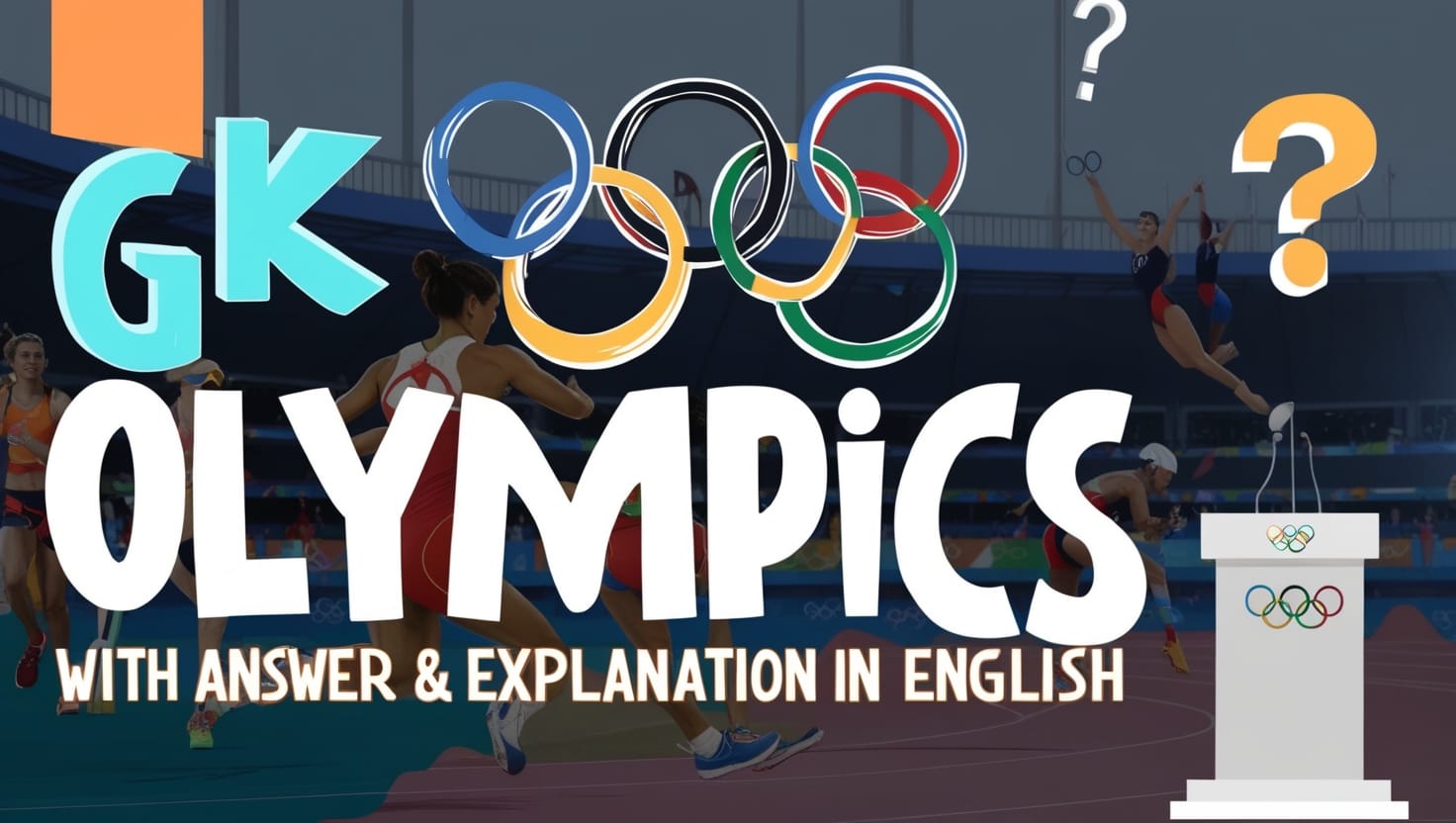
The Olympic Games, known for bringing together the world’s finest athletes and showcasing human excellence, have a rich history and countless memorable moments. This article, titled Olympics GK MCQs With Answer & Explanation in English, offers a collection of multiple-choice questions designed to challenge and expand your knowledge of the Olympics.
Whether you’re a sports enthusiast, a student, or someone interested in global athletic achievements, these MCQs provide valuable insights with detailed answers and explanations. Dive in to test and enrich your understanding of the Olympic Games!
1. What is the normal frequency of the Olympics Games?
- 2 Years
- 4 Years
- 6 Years
- 8 Years
Show Answer
Answer: 4 Years
The Olympic Games follow a four-year cycle, with the Summer and Winter Olympics alternating every two years within that period. This arrangement allows for a regular and predictable schedule for both events, ensuring a global celebration of sportsmanship and competition. The idea is to maintain a balance and showcase different sports on the world stage.
2. What is the time difference between the Summer Olympics and Winter Olympics?
- 1 Year
- 2 Years
- 3 Years
- 4 Years
Show Answer
Answer: 2 Years
The standard interval between the Summer and Winter Olympics is two years. This biennial pattern ensures that each type of Olympic Games occurs at regular intervals, allowing athletes and fans alike to eagerly anticipate and participate in these major sporting events. This rhythmic schedule contributes to the sustained excitement and interest in the Olympic movement.
3. How long does one season of a modern Olympiad last?
- 2 Years
- 4 Years
- 6 Years
- 8 Years
Show Answer
Answer: 4 Years
A modern Olympiad spans four years, commencing on January 1 of the year when the Olympic Summer Games take place. This structure provides a framework for organizing and planning the various Olympic events and activities. The four-year cycle aligns with the broader scope of the Olympic Games, incorporating both the Summer and Winter editions.
4. Which country is the birthplace of the “Olympic Games”?
- Denmark
- Italy
- Greece
- Germany
Show Answer
Answer: Greece
The concept of the Olympic Games traces its roots to ancient Greece, where the original Olympic Games were conducted in Olympia. The modern Olympic Games draw inspiration from this historical tradition. The ancient Olympics, which occurred from the 8th century BC to the 4th century AD, were a prominent cultural and athletic event dedicated to Zeus, the king of the Greek gods.
5. The first ancient Olympic Games were dated to which year?
- 1776 BC
- 776 BC
- 776 AD
- 1776 AD
Show Answer
Answer: 776 BC
The inaugural ancient Olympic Games are conventionally believed to have commenced in 776 BC. These games were a manifestation of religious and cultural practices, serving as a tribute to Zeus. Held in Olympia, Greece, they represented a significant part of ancient Greek civilization and laid the foundation for the modern Olympic movement, fostering ideals of unity, athleticism, and international cooperation.
6. Who is known as the father of the modern Olympic Games?
- Woodrow Wilson
- Pierre de Coubertin
- Spyridon Samaras
- Herbert Hoover
Show Answer
Answer: Pierre de Coubertin
Pierre de Coubertin is widely recognized as the father of the modern Olympic Games. In 1896, he founded the International Olympic Committee (IOC), a pivotal step in rejuvenating the Olympic movement. Coubertin’s vision aimed to promote international understanding and cooperation through sports, and his efforts laid the foundation for the modern Olympic Games.
7. Which country houses the headquarters of the “International Olympic Committee”?
- Greece
- Switzerland
- Belgium
- France
Show Answer
Answer: Switzerland
The headquarters of the International Olympic Committee is situated in Lausanne, Switzerland. Lausanne serves as the central hub for the IOC’s administrative and organizational activities. The location underscores the international and neutral nature of the Olympic movement, fostering collaboration and communication among diverse nations and cultures.
8. In which year was the “International Olympic Committee” formed?
- 1892
- 1894
- 1896
- 1898
Show Answer
Answer: 1894
The International Olympic Committee was established in 1894 through the collaborative efforts of Pierre de Coubertin and Demetrios Vikelas. This formation marked a crucial moment in Olympic history, as it laid down the framework for the governance and coordination of the modern Olympic Games. Coubertin’s passion for the Olympics, coupled with Vikelas’s involvement, set the stage for the global celebration of athletic excellence.
9. In which year were the first modern Olympic Games held?
- 1892
- 1894
- 1896
- 1898
Show Answer
Answer: 1896
The inaugural modern Olympic Games took place in 1896 in Athens, Greece. This historic event marked the revival of the Olympic Games in the modern era, with athletes from various nations participating in a spirit of friendly competition. The Athens Games of 1896 laid the cornerstone for the subsequent editions, solidifying the Olympic Games as a symbol of international unity and sportsmanship.
10. Who was the first President of the International Olympic Committee?
- Pierre de Coubertin
- Demetrios Vikelas
- Woodrow Wilson
- Winston Churchill
Show Answer
Answer: Demetrios Vikelas
Demetrios Vikelas holds the distinction of being the first President of the International Olympic Committee (IOC). Serving as president from 1894 to 1896, Vikelas played a foundational role in the early development of the IOC, contributing to the establishment of the principles that govern the Olympic movement.








Leave a Reply